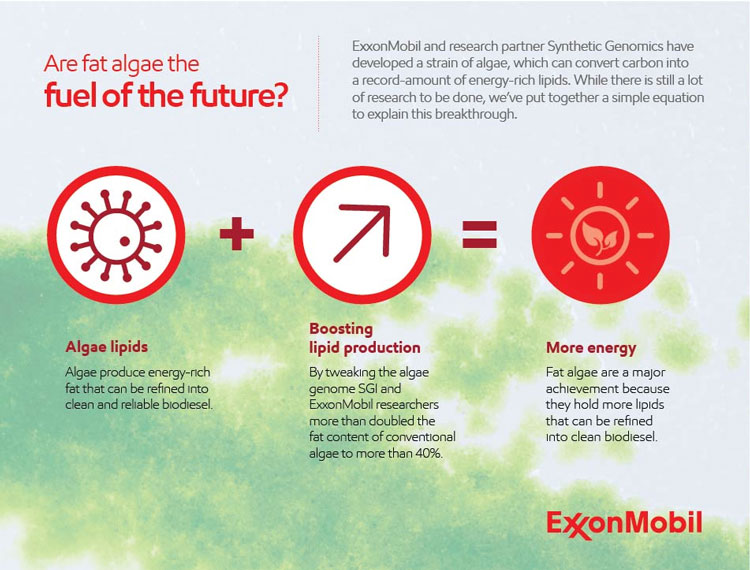Scientists from Synthetic Genomics (SGI) and ExxonMobil have developed a strain of algae able to convert carbon into a record amount of energy-rich fat, which can then be processed into biodiesel.
While algae using CO2 to generate fat is not new, it’s the amount of fat produced by the algae that’s noteworthy. Fatty algae make the strain more fit to eventually produce biofuels at an industrial scale.
Success in developing algae-based biodiesel at commercial levels will provide a number of tangible benefits. The fuel emits fewer greenhouse gases than most conventional energy sources, and that will help strengthen our ongoing transition to low-emission energy resources. Also, unlike other biofuel feedstocks, such as corn, algae production at an industrial scale would not stress food production.
Growing the amount of algae fat didn’t happen overnight. SGI and ExxonMobil began collaborating in 2009. SGI has long been a leader in using synthetic biology and genomics to create systems that help solve global sustainability challenges. Their work has had lasting impacts on fields like pharmaceuticals, vaccines and nutritionals. With ExxonMobil, they’re tackling sustainable energy through algae.
To boost fat production, SGI scientists worked with their counterparts at ExxonMobil as nutritionists of sorts, tweaking the part of the algae genome responsible for the assimilation of nitrogen, an essential nutrient. The change is an algae with about 40% of its mass as fat. That’s more than double the fat content of conventional algae.

“We knew that algae had the potential to be more productive than other biofuel sources like corn and soy beans and, unlike those, they don’t require arable land or freshwater,” Alessandro Faldi, ExxonMobil scientist, explained.
“It was a true eureka moment when we knew what we had,” said Rob Brown, SGI’s senior director and the lead scientist on the algae project. “After testing and retesting the breakthrough, ensuring it wasn’t just a false positive, a cheer went up in the lab. If you can imagine people doing cartwheels down the hall, that’s what it feels like after years of research to move the needle in such a substantial way.”
Faldi and Brown are quick to emphasize that this is only a first step. The ongoing challenges are not lost on the team. Still, Faldi is inspired by this latest breakthrough and sees it as a necessary and positive move in the right direction that will strengthen SGI and ExxonMobil’s fruitful collaboration to develop algae-based biofuels at a commercial scale.
Simply put, innovation is a string of successes, and this latest breakthrough is an important step toward making algae biodiesels a reality.
“This step is critical, but it’s important to keep our focus down the line to where we need to go,” Faldi said. “We will need to increase the algae’s ability to convert the sun’s energy into biomass to further increase fat production and will begin testing and engineering more algae grown under various conditions. There’s still a long journey ahead of us.”

Comments are closed, but trackbacks and pingbacks are open.